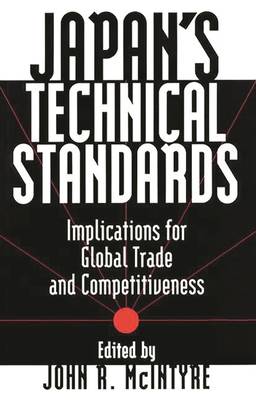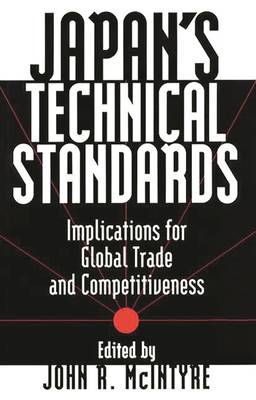
- Afhalen na 1 uur in een winkel met voorraad
- In januari gratis thuislevering in België
- Ruim aanbod met 7 miljoen producten
- Afhalen na 1 uur in een winkel met voorraad
- In januari gratis thuislevering in België
- Ruim aanbod met 7 miljoen producten
Japan's Technical Standards
Implications for Global Trade and Competitiveness
John McIntyreOmschrijving
Although little is known about the dynamics of the Japanese system of setting technical standards, it is alleged that it often acts as a non-tariff barrier of last resort to corporations abroad seeking markets for their products in Japan. Addressing the problem from a multidisciplinary perspective, Dr. McIntyre and his colleagues show how the system works and its impact on market penetration strategies of non-Japanese firms. In doing so, they also provide the first book-length English-language discussion of how the system affects market share growth of corporations worldwide and helps boost Japanese technology-based competition. A cogent analysis for professionals in manufacturing, quality, and operations management, as well as executives concerned with the legal aspects of international trade and regulations.
Japan's Technical Standards draws on the experiences and knowledge of an international group of academics and business professionals. Based on presentations given at a 1995 conference at the Georgia Tech Manufacturing Research Center, the book's 12 chapters provide an expanded and up-to-date study of this vexing problem in international commerce. Technical standards govern the design, operation, manufacture, and use of nearly everything humankind produces, but they generally go unnoticed. With the evolution of global markets, however, standards have evolved as important means to facilitate international trade flows--but they can also be impediments used by countries to gain advantage over foreign cometitors. In fact, says Dr. McIntyre, they often define whether a product will or will not be approved for entry and use in a given national market. His book thus seeks to answer four interrelated questions:
*How does the Japanese technical standards system work when viewed in a national and internationally comparative light?
Specificaties
Betrokkenen
- Auteur(s):
- Uitgeverij:
Inhoud
- Aantal bladzijden:
- 208
- Taal:
- Engels
Eigenschappen
- Productcode (EAN):
- 9781567200539
- Verschijningsdatum:
- 28/02/1997
- Uitvoering:
- Hardcover
- Formaat:
- Genaaid
- Afmetingen:
- 162 mm x 241 mm
- Gewicht:
- 449 g

Alleen bij Standaard Boekhandel
Beoordelingen
We publiceren alleen reviews die voldoen aan de voorwaarden voor reviews. Bekijk onze voorwaarden voor reviews.









